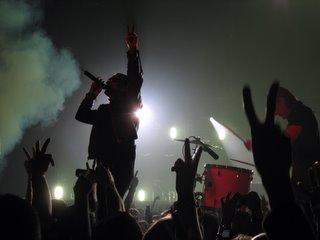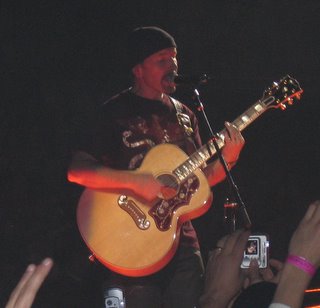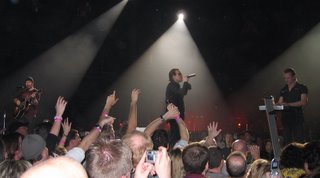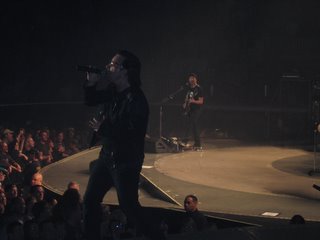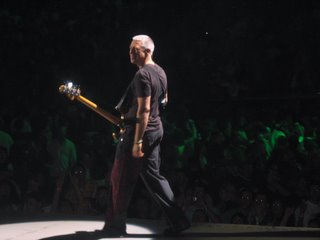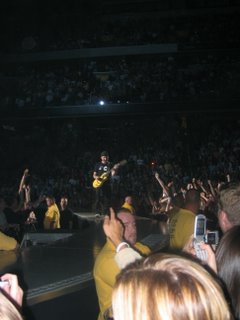
For Chicago 2 (5/9) we arrived at 7:00 pm. I had seen the Chicago PD writing a citation to someone (who looked like a fan & not a scalper) for selling tickets at the main entrance (which is verboten). There was no line to get in the GA entrance. No security wanding. We just walked right in with my camera in my back pocket. Both my ticket & Jean’s ticket were scanned & got the dreaded “Proceed to floor” as opposed to “Vertigo” which puts you in the egg/ellipse/bomb shelter/pit. We were able to get about 20 feet from the outer ellipse Edge side of center. After Kings of Leon (they were good, not great. They did not suck) finished many people left the floor for the bathroom/beer break. Essentially everyone else moved ahead. It was nearly impossible for the returnees to get back to their original spot. From our vantage point the sound was killer (very loud BTW). It can be hard to see the main stage at times & I’m 6’1”. When the band comes around to the front of the ellipse it’s a fantastic view. The crowd was really on for this show as the band was definitely sizzling.
For Chicago 3 (5/10) I went solo. I arrived at 6:30 pm & the GA line was about 75-100 people deep with heavy security wanding going on. I walked around the venue for a while & spotted at least a dozen scalpers mumbling “tickets’ under their breath (none at the main entrance). I watched the GA entrance line fade out & then walked right in around 7:10 again without any wanding. There were 10 people in front of me. Every single one got “Proceed to floor”. I thought for sure my odds were looking good. Nope. Sorry. (Is there someone with a remote camera & a remote control making these “random” egg selections??)
I hung out by the soundboard & watched the crews for a while. I witnessed 3 separate ellipse banding feeding frenzies between 5-10 minutes prior to show time & 5-10 minutes after liftoff. This all occurred in front of the relatively open soundboard area behind the tight fan cluster towards the stage. There were 3 different crew members who had about a dozen bands each. They all were surrounded with wrists (including mine) in their face. One crew member got pissed at being crowded & said. “I’ve had enough of you people. Get out of here... that’s it” I ran into a guy (who bought a GA ticket outside for $60) who got lucky for Chicago 2 the night before. He said he was standing in this same area talking to 2 very attractive women when a crew member slapped bands on them. He stuck his wrist in & got one. He identified the same crew member again this night. We went to her & pleaded, but got the cold shoulder big time. I kept my eyes peeled for other bandings but that was it. So I then moved up to 15-20 feet from the end of the stage on Adam’s side. I spotted the band’s manager, Paul McGuiness, at one point. I thought the crowd was less fired up the 2nd night. The big surprise was a reprise of Vertigo at the end, which was major league fired up. The best of the 3 renditions.
The 2 sets I saw were unusually very similar & this was likely due to the tour DVD being filmed only on those 2 nights in attempt to put together editable sequences.
Last night’s set list at Chicago 4 (5/12) was the most mixed up & apparently most fired up show to date according to the reviews:
Main Set: Vertigo, All Because Of You, Elevation, Gloria, The Ocean, Beautiful Day, Miracle Drug, Sometimes You Can't Make It On Your Own, Love and Peace or Else, Sunday Bloody Sunday, Bullet the Blue Sky - When Johnny Comes Marching Home, Running to Stand Still, City of Blinding Lights, Original of the Species, Pride, Where the Streets Have No Name, One
Encore(s): Until the End of the World, The Fly, Mysterious Ways, With or Without - Strangers in the Night, Yahweh, Bad - Norwegian Wood - Sexual Healing - 40
Comments: For the last of four nights in Chicago, and with the film cameras off, U2 throws its setlist in the blender. 'Vertigo' opens a show for the first time. 'All Because of You' and 'Original of the Species' are played in the main set for the 1st time. 'Until the End of the World' makes its Vertigo Tour debut. The show closes with 'Bad', which gets extended with several snippets, finally wrapping up with a bit of '40', the traditional show closer this tour.
Jean had a Bono & Adam sighting after she & I split for the day Tuesday. They were coming out of the downtown Park Hyatt ~4:00pm on their way to the sound check.
We went into Sak’s to check out Bono’s new EDUN line of clothes, way to metrosexual for me. The clerk said Bono was doing an in-store Wednesday.
My friend Max talked to one of his paramedics that provides EMS/first aid at the Riviera in Chicago. He said Bono was there Wednesday night to see the Killers.
Well, that’s more than enough. It was a thrill to go on a musical journey.

Here's the Tribune review:
U2's march of the tired warhorses hamstrings fine ensemble effort
By Greg Kot
Tribune music critic
Published May 9, 2005
The corporate juggernaut that is U2 takes over Chicago this week with four sold-out shows at the United Center in-between singer Bono's latest efforts to save the world. These efforts would have been enhanced Saturday by a concert that relied less on U2's past and more on songs that haven't overstayed their welcome.
On opening night, Bono lamented that a decade ago he would place calls to the White House in the midst of the band's "Zoo TV" tour, but they went unanswered. "They take my call now," he said, and the audience cheered. He went on to urge the audience to text-message his Unite Against Poverty organization which is designed to pressure politicians to follow through on the United Nations' goal of cutting world poverty in half by 2015. It was yet another example of the rock concert as political advertisement, following closely on the heels of last year's Bruce Springsteen-led Vote for Change tour that aimed to oust George Bush from the White House.
U2's gambit will no doubt engender a lot of eye-rolling from those who have grown tired of Bono's increasingly high celebrity-activist profile. But the singer's social activism also had musical relevance, as it provided the thematic backbone to U2's current tour. During a sequence of songs including "New Year's Day" and "Sunday Bloody Sunday" that addressed how religion continues to become an excuse for violence, he donned a scarf adorned with religious symbols and declared, "Jesus, Jew, Mohammed is true."
The scarf became a blindfold on "Bullet the Blue Sky," which segued into the Civil War anthem "When Johnny Comes Marching Home." It was a bit of Bono-esque theater, part hokum but all heart.
For anyone who has felt anything for the band since it made its Chicago debut more than two decades ago at the Park West, the do-gooder self-righteousness is part of the package. It's driven as much by ambition and ego as it is social and artistic reasons, and sometimes it works spectacularly: "Zoo TV," unanswered White House phone calls and all, remains a landmark of multimedia arena rock.
My quibble is not with the motive so much as with the execution. Things got off to a rocky start a few months ago, with a bungled ticket sale that brought a public apology from drummer Larry Mullen Jr. at the Grammy Awards, and again from Bono during Saturday's encore.
The tour follows the release of the band's latest studio album, "How to Dismantle an Atomic Bomb," but doesn't really make a case for it. Though the album is strictly U2-by-the-numbers, a retreat back to its early '80s sound, the stage is the true measure of the quartet's songs.
The band was in fine form: Bono brought a new sense of nuance and phrasing to his singing, the Edge delved into blues by way of Jimi Hendrix during his guitar solo on "Bullet," and Mullen and bassist Adam Clayton remained implacable guardians of the Big Beat. Little wonder the "Atomic Bomb" tracks came on strong at the United Center, with a tambourine-inflected "All Because of You," a luminous "City of Blinding Lights" bathed in confetti, and especially a hymnlike "Sometimes You Can't Make It on Your Own," with Bono paying tribute to his late father while pacing the walkway that ringed the elliptical stage. Here was U2 at its best, shrinking a stadium to a living-roomlike level of intimacy.
But at least half the show was consumed with a run through U2 warhorses that were already starting to sound exhausted on previous tours: "Pride (In the Name of Love)," "Where the Streets Have No Name," "One." Save for the belly dancer missing in action from "Mysterious Ways," this was tired nostalgia, apparently to sate customers who shelled out hundreds of dollars for tickets.
It appears U2 is falling into the same trap as the Rolling Stones: Charging big money for a stadium show obligates the band to turn into a hits jukebox. But especially in a city such as Chicago, where U2 has been embraced like few other bands, the quartet can afford to take more chances. The promise of U2 has always been big music tied in with conviction, imagination and innovation. Now the band sounds like it believes less in its ability to surprise and dazzle with its new music, and more in the necessity to recycle its past. If that trend continues, U2's avid concern for social justice won't be enough to keep it relevant.
----------
Bono didn't like that review, so here's the face off:
TRIBUNE EXCLUSIVE
Bono: 'We need to talk'
U2's frontman sits down with Greg Kot to 'clear the air' about negative reviews, the band's direction and the role of rock 'n' roll
By Greg Kot
Tribune music critic
Published May 22, 2005
Bono is steamed.
It's not every day that I answer my cell phone and hear the lead singer of U2 expressing serious disagreement with something I've written, but that day has arrived.
"You've offended us," he says as I weave up Lake Shore Drive during evening rush hour, trying not to crash into a concrete barrier while I reach for my notebook. "There's a dark cloud over us and we need to talk."
I've covered the band for 15 years, interviewed Bono a half-dozen times and attended virtually every one of U2's Chicago concerts since the Irish quartet first played at Park West in 1981. Along with R.E.M., U2 is the most important mainstream rock band of my generation, a band that set a new standard for how an arena rock concert could feel and what it could communicate. In the '90s, Bono, guitarist The Edge, drummer Larry Mullen Jr. and bassist Adam Clayton gave their well-honed approach a twist on such adventurous albums as "Achtung Baby" (1991), "Zooropa" (1993), the "Passengers: Original Soundtracks I" side project (1995) and "Pop" (1997).
But "Pop" bombed commercially by U2 standards, and the band seemed to lose its nerve. It made two consecutive albums, "All That You Can't Leave Behind" (2000) and "How to Dismantle an Atomic Bomb" (2004), that retreated from the innovations of the '90s and settled for a retro '80s sound. In February, the Tribune published an article in which I chastised the band for a series of dubious artistic and business decisions. It was prompted by a flood of irate e-mails from fans who had paid $40 to join U2's fan club in order to gain access to pre-sale tickets for the band's North American tour. The sale was a public-relations disaster. Some fan-club members reported they couldn't even get tickets, or paid nearly $200 for third-balcony seats, while scalpers were selling tickets on eBay for more than $600. It was the latest in a series of missteps that prompted me to question whether this once-vital band was turning into the Rolling Stones, more of a corporation focused on perpetuating itself than a creative force.
There was the ubiquitous television ad (for which they were not paid) in which "Vertigo," the first single from "Atomic Bomb," was turned into a commercial for Apple's portable music device, the iPod. There were the unusually conservative albums, evidence that the band had run out of ideas or the will to challenge itself and its audience. There was the live appearance at the Super Bowl halftime in February 2002, the type of marketing opportunity that presented even the most idealistic brand of rock as just another product.
It was these criticisms that prompted Bono's Lake Shore Drive call. A day after that conversation, I attended the first concert in U2's four-night sold-out run at the United Center. My review focused on the tired set list. U2 played some new songs early in the two-hour performance, but instead of building a case for the new album and possibly redeeming it, the quartet reserved all the big-bang moments for its greatest hits, songs that had been in the set list for a decade or more. They sounded more than ever like the bands they once arose to replace, the dinosaur acts of the '60s.
All of this is part of what should be the relationship among the artist, the critic and even the audience, which at the United Center was wildly cheering (as they always do) every note. Critics, on the other hand, are not cheerleaders. They are paid to honestly and passionately react to what the artist does -- for better or worse. When it's the latter, audiences are often more vocal in their defense than the artists. But Bono was different.
After the review appeared in the Tribune, Bono invited me to attend another show. Later, he would acknowledge that my review of the first concert wasn't off base. "We weren't at our best," he said. When I attended the final show of the four-night stand, the song deck had been shuffled, and the band grew more daring. A new song that wasn't in the first night's set, "Original of the Species," was a highlight. It's a soul ballad with a melody so suggestive that it compelled me to go back and hear what I had missed the first time on the "Atomic Bomb" album. If not a return to the old boldness, the performance certainly made me aware of something that I had missed about the album several months before: the classic beauty of some of the less-immediate songs.
The next morning, Bono and I met at a corner table in a swanky restaurant overlooking Michigan Avenue. "Stick 'em up," he rasped as he approached from behind, finger on an imaginary trigger pressing into my left kidney. It was 9 a.m., and the previous night's concert had left the unshaven singer a touch hoarse. But he was in a spry mood and claimed to do all his best work before noon. "I sometimes wish we could play our concerts right after I wake up," he said, peering out from behind his tinted wraparound glasses after ordering a breakfast of poached eggs and toast. The ire in his voice of the previous week had softened to a contentious but melodious brogue.
"Larry [Mullen, the band's drummer] is going to kill me for doing this," Bono said. "But I want this on the record. Some of what is going around as a result of your article is not just unhelpful to our group and our relationship to our audience, but just really problematic for what in the broad sense you might call rock music. The things you think are wrong with it, and the things that I think are wrong with rock music, are polar opposite. Your vision of rock and mine are 180 degrees apart. And that's why I need to talk to you."
A portion of that 90-minute conversation, edited for length, clarity and language, follows.
KOT: You're an important band for my generation. A band that led by example: This is how to do it, how to be a successful band without compromising your principles. But when the ticket sale went wrong this year, I got hundreds of e-mails from fans who felt you had let them down, that their loyalty was betrayed.
BONO: Everybody in this band knows about that debacle, and regrets it, and we've taken steps to prevent it from happening again. I think most fans understand what happened. Our eyes were not on that ball the way they normally would be. Our eyes were on trying to determine whether we would be going on tour at all. There are things that we can't discuss in the interview that were going on within the band that just took precedence. Most U2 fans knew what that was [serious health problems in the family of a band member]. I thought it was really disingenuous of them and you not to recognize that this is not normal behavior from this band. Complain, yeah. Something did go wrong. That was a mistake, and we tried to put it right.
KOT: The first I heard about the internal problems in the band was when Larry apologized about it at the Grammys. Before the article was published, I tried for three weeks to get information from the band, to interview you. Yes, this was not normal behavior from U2. Instead, you steer me to the record company president and the tour promoter. You let these business guys answer for you.
BONO: I'm really sorry about that. It's our fault that didn't happen. But it's done, and we've taken care of it.
KOT: The ticket sale to me was just the tip of a larger issue, which is: Is the band losing sight of what it once was? The iPod ad, the Super Bowl halftime appearance, the Grammy Awards appearances -- I didn't think U2 was about that sort of promotion.
BONO: That's a really important point that I want to get across to you. There's this poverty of ambition, in terms of what rock people will do to promote their work. That's a critical issue to me. The excitement of punk rock, in the Irish and UK scene when we were coming up, was seeing our favorite band on "Top of the Pops," right next to the "enemy." That would be exciting. We did talk shows, TV shows, back then. The great moments of rock 'n' roll were never off in some corner of the music world, in a self-constructed ghetto. I don't like that kind of thinking. I know some of it exists, and some of our best friends are part of it. It's not for me. Progressive rock was the enemy in 1976. And it still is. And it has many, many faces. This beast is lurking everywhere. It can describe itself as indie rock. It's the same [blanking] thing. It's misery. I have seen so many great minds struck down by it. . . . When you suggest we're betraying ourselves by doing TV shows and promotional stuff, to me the Super Bowl was our Ed Sullivan moment. It just came 25 years later. I didn't expect it. But it is one of the moments I'm most proud of in my life.
KOT: Why is the idea of associating a song with a product a good idea?
BONO: I accept that that is alarming. I really do. Our being on TV, I don't have a problem with that -- we should be on TV. But OK, associating our music with a product. You've got to deal with the devil. Let's have a look. The devil here is a bunch of creative minds, more creative than a lot of people in rock bands. The lead singer is Steve Jobs. These men have helped design the most beautiful object art in music culture since the electric guitar. That's the iPod. The job of art is to chase ugliness away. Everywhere we look we see ugly cars, ugly buildings . . . [he pauses, and looks out the window at the Chicago skyline]. . . . You're lucky here in Chicago on that front. But you see ugly objects in the workplace. Everywhere. And these people are making beautiful objects. Selling out is doing something you don't really want to do for money. That's what selling out is. We asked to be in the ad. We could see where rock music is, fighting for relevance next to hip-hop. And I love hip-hop. It's the new black entrepreneur. It's about being out there, loud and proud about what you're doing. Selling it on the street corner if you have to. From pent-house to pavement. Advertising the new song in another song. Taking on the world. Meanwhile, a bunch of white, middle-class kids are practicing in Daddy's garage, saying [adopts fake Midwestern whine], "No, man, that is just so un-cool." As hard as it is, as ghetto as it is, hip-hop is pop music. It's the sound of music getting out of the ghetto, while rock is looking for a ghetto. We never wanted to be a garage band. We wanted to get as quick as we could out of the garage. The people who say they like the garage usually have two or three cars parked outside. Rock music is niche. We want people who aren't in our niche listening to our music. If you pour your life into songs, you want them to be heard. It's a desire to communicate. A deep desire to communicate inspires songwriting. Rock music was most exciting when it was in the 45 [rpm single], when it was disciplined into a single. Whether it was the Sex Pistols, Clash, Buzzcocks, Nirvana, the Beatles, the Stones. The 45 is the pure rock to me. That is why I wanted to be in a band.
KOT: I understand that, but I've seen some of my favorite songs corrupted because of that attitude. [Iggy Pop's] "Lust for Life" is now a Jamaican vacation commercial. I don't know if I want to listen to that song anymore.
BONO: If I love the song, I love the song. We looked at the iPod commercial as a rock video. We chose the director. We thought, how are we going to get our single off in the days when rock music is niche? When it's unlikely to get a three-minute punk-rock song on top of the radio? So we piggybacked this phenomenon to get ourselves to a new, younger audience, and we succeeded. And it's exciting. I'm proud of the commercial, I'm proud of the association. We have turned down enormous sums of money to put our songs in a commercial, where we felt, to your point, where it might change the way people appreciated the song. We were offered $23 million for just the music to "Where the Streets Have No Name." We thought we could do a lot of good with that money. Give it away. But if a show is a little off, and there's a hole, that's the one song we can guarantee that God will walk through the room as soon as we play it. So the idea that when we played it, people would go, "That's the 'such-and-such' commercial," we couldn't live with it. Had it been a cool thing, or didn't have a bad association, or it was a different song, we might've done it. But we have to start thinking about new ways of getting our songs across, of communicating in this new world, with so many channels, with rock music becoming a niche. I hear so many songwriters describe their songs as their children, that they have to look after them. [Nonsense!] They're your parents, they tell you what to do. They tell you how to dress, how to behave when you're playing them. They tell you what the video looks like. If you listen to them, they manage you. And if you get it right, they pay for your retirement [laughs]. Because songs demand to be heard. "Vertigo," which you didn't like, is deceptively simple. That riff, you can think, "Aw yeah, another rock song." It doesn't become great the first time you hear it. It becomes great the thousandth time you hear it. And that's true of a lot of rock riffs. So we have to get the density of exposure for that to be a hit.
KOT: You told me the other day that U2 had "Kid A'd" itself to death [a reference to Radiohead's 2000 progressive-rock album "Kid A"]. It was a funny line, but I'm disappointed to hear that.
BONO: I want to hear Radiohead, extraordinary band that they are, on MTV. I want them setting fire to the imaginations of 16-, 15-, 14-year-old kids. I was 14 when John Lennon set fire to my imagination. At that age, you're just [angry], and your moods swing, and it's an incredible time to be hit with something like that. Our last two albums are essentially about the combo. We used the limitations of the combo. We had 10 years of experimentation. We decided to rope it in, and tie ourselves to only one thing. And that's the only discipline. Is it a great song? Is it fresh? Experimenting in rock is at its best when you dream from the perimeters and bring it back to the center. All my favorite innovators disappear into the woods and bring something back, and you get to hear the songs distilled from those experiments. I used "Kid A" as an example, because I love the album. We did our "Zooropa," we did our "Passengers," even our "Pop" experiment. There were great ideas on that album, but we didn't have the discipline to screw the thing down and turn them into magic pop songs. We'd become progressive rock! Ahhh!
KOT: You're killing me now. I thought those '90s albums were great. I didn't understand "Achtung Baby" right away. But after seeing the tour, I realized it was your best album. I still feel that way. And I loved "Zooropa" in that way, and "Pas-sengers." I even liked "Pop." To me, you guys were showing us how it should be done. You were [screwing] with our heads and making great music. You were doing those weird ballads from "Pop" as an encore at Soldier Field [in 1997]. I loved that you were so far out on a limb with saw in hand, and you were trying things, pushing things. And now you never play songs from those albums anymore. What happened?
BONO: We have ideas that we want to communicate [in a concert], not just a bunch of songs. If we get it right, it feels like one song. What band at our level would play 10 songs, seven from the new album and three from our first album? The reason we do that is because this album and our first album have very similar themes. The first is an ode to innocence, as it's being held onto. The latest is an ode to innocence, as it's been remembered, with the thought that you can get back to it. There's nothing in U2's catalog that sounds remotely like "Vertigo." It's completely fresh. "Ver-tigo" is actually quite a gem, contrary to what you say, and it's very new. For the second half of the show, we take on this notion of the journey of equality. This is our generation's challenge. So we thought about using flags as a backdrop during "Where the Streets Have No Name." I remember singing it the first night: It's not a very good lyric, but it has really great ideas suggested in the lyric, the idea that you could go on a journey to that other place. That lyric was written in a dusty field in northern Ethiopia, and I can finally make sense of it because of what we're talking about in this show. And then we go into "One," and we could do a new arrangement of "One" as you might want us to, but you see, I'm only one member of this band, and Edge is three. And if he thinks an arrangement is perfect, why mess with it? He says, "I'm not jamming here. That's a guitar melody. I've written it. I can't improve on it." Adam and I are the jazz men in the band. But the Teutonic Larry Mullen and the Presbyterian Edge always demand, "No fat. Back to the original arrangement. We're not going to change the bass line just because we feel like it."
KOT: It helped when you put "Original of the Species" in the set last night. It made me want to hear what I missed on the re-cord. That's what was lacking in the first show [at the United Center].
BONO: It's a classic, especially on the album. We have to figure out how are we going to get that song on MTV. Those songs do not come around easy. The melodies of most songs are A-B, A-B, and this is A-B-C-D. The construction of it is unique. And I want you to want us to have that song out on the radio. Because it's about other bands [who value songwriting] coming through. It's not just us. Rap-metal nearly put the white race in jeopardy [as a creative force]. It's a travesty. Those [rap-metal] people should just take suicide pills and go away. What we have to offer, if we're lucky, are lyrics, some interesting arrangements and beautiful melody. That's what rock music can do right now. To be relevant, to set the imagination off on a new generation coming up. Songs that up the ante.
KOT: It sounds like "Pop" didn't work for you because it didn't sell. To my mind, it worked because it was a good, daring album. There's no shame in not selling.
BONO: It didn't communicate the way it was intended to. It was supposed to change the mood of that summer [1997]. An album changes the mood of a summer when you walk out of a pub and you have those songs in your head. And you hear them coming from a car, an open window. It changes the mood of the season. Instead it became a niche record. And I know you're a man who appreciates the niche. And I'm glad you appreciate that one, but that's not what it was intended to be. It's not about sales; we don't need the cash. It's about your ambition for the song. With "Pop," I always think if we'd just had another month, we could have finished it. But we did a really bad thing. We let the manager book the tour, known in this camp as the worst decision U2 ever made, and we had to wrap up the album sooner than we wanted. You don't need an album to communicate for you to enjoy it, you don't need it to be trimmed of fat to enjoy it, because you're enjoying the ideas, the textures. But for me to enjoy it, I need it to do that [communicate on a wider level].
KOT: The last two albums look back. With "All That You Can't Leave Behind," I thought you made your retro record, you'd made your [version of the Stones' 1978 album] "Some Girls," an album that sums up all your best moves in a concise way. You're allowed to make that album, once. Now you've made "All That You Can't Leave Behind," and you're looking back and I think, whoops, you really are turning into the Stones. I expected more; I expected you to break out of that box.
BONO: Hey, there are some amazing songs on [the Stones' 1994 album] "Voodoo Lounge." But what you're missing is that each time [in history] has a mood. You think it's looking back-ward; I think it's looking forward. I think to be in a studio, tied to the four-piece band setup right now is a very modern thing to do. And to use that mystery and power to write songs, we did two records like that. This one goes even further than the last one in that direction. You get beauty like "Original of the Species" that you can play on a piano. Just put piano and voice on that song, and it's special. That's not retreat. That is progressive. That is progress.
KOT: The strength of your band has always been that you build a case for your new music on the road. And it's my job to say when you don't.
BONO: As a writer who cares deeply about music, you're right to give rock bands a kicking when they deserve it. And we have deserved it at times. But you also need to explain to us how rock can progress. And I would like it if writers would step back and look at what we've done . . . [apart from] the codified rules and regulations that are suffocating rock music right now. Great groups were broken up, like the Clash, because of ridiculous concepts like not selling out. It's the cultural revolution in China all over again: Let's rid rock music of thinkers; let's rid rock music of big ideas. I saw it destroy great groups like Echo and the Bunnymen, extraordinary talents who crashed and burned on these things. You tell me about the hundreds of e-mails you got, well I got them with every single turn this band has made. I got them when we made the "War" album. I got them when we made "Joshua Tree." I got them when we made "Achtung Baby." Of course we're going to lose fans along the way who don't like what we're doing. But you need to understand what we're actually trying to do, and that's why we had to have this talk.
KOT: I had to laugh, because at last night's show you said that "some really annoying people are standing up" for what they believe in, "and God bless them." That reminds me of you, including the annoying part.
BONO: [Laughs] Yes, you're right.
KOT: But you do have the courage of your convictions. You don't care what people think of you for having those convictions. You sparked a weeklong debate in this town about music, and what kind of social role it should play, and why people care about it, and why they should care about it.
BONO: We've always annoyed people. Around the time of "Zoo TV," we were in danger of being cool, but we fixed that [laughs]. Now there are loads of people who would love to murder me on a daily basis. Stirring it up, it's good. Our definition of art is putting your head above the parapet, and be ready for the custard pie. I happen to love the taste of it.
--------------------

